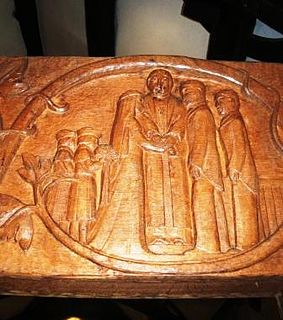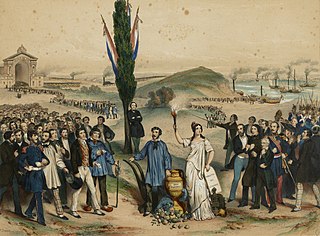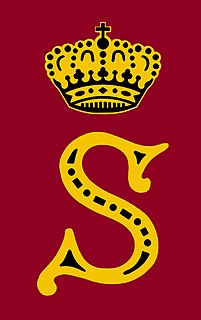Related Research Articles
Labour law mediates the relationship between workers, employing entities, trade unions and the government. Collective labour law relates to the tripartite relationship between employee, employer and union. Individual labour law concerns employees' rights at work also through the contract for work. Employment standards are social norms for the minimum socially acceptable conditions under which employees or contractors are allowed to work. Government agencies enforce labour law.

A spouse is a significant other in a marriage, civil union, or common-law marriage. The term is gender neutral, whereas a male spouse is a husband and a female spouse is a wife. Although a spouse is a form of significant other, the latter term also includes non-marital partners who play a social role similar to that of a spouse, but do not have rights and duties reserved by law to a spouse.

Suffrage, political franchise, or simply franchise is the right to vote in public, political elections. In some languages, and occasionally in English, the right to vote is called active suffrage, as distinct from passive suffrage, which is the right to stand for election. The combination of active and passive suffrage is sometimes called full suffrage.

Women's suffrage, is the right of women to vote in elections. Beginning in the mid-19th century, aside from the work being done by women for broad-based economic and political equality and for social reforms, women sought to change voting laws to allow them to vote. National and international organizations formed to coordinate efforts towards that objective, especially the International Woman Suffrage Alliance, as well as for equal civil rights for women.

The Senate is one of the two chambers of the bicameral Federal Parliament of Belgium, the other being the House of Representatives. It is considered to be the "upper house" of the Federal Parliament. Created in 1831 as a chamber fully equal to the Chamber of Representatives, it has undergone several reforms in the past, most notably in 1993 and 2014. The 2014 elections were the first without a direct election of senators. Instead, the new Senate is composed of members of community and regional parliaments and co-opted members. It is a chamber of the communities and regions and serves as a platform for discussion and reflection about matters between these federated entities. The Senate today plays a minor role in the federal legislative process. However, the Senate, together with the Chamber, has full competence for the Constitution and legislation on the organization and functioning of the Federal State and the federated entities. Since the reform of 2014, it holds about ten plenary sessions a year.

The term "serf", in the sense of an unfree peasant of the Russian Empire, is the usual translation of krepostnoi krestyanin which meant an unfree person who, unlike a slave, could be sold only with the land he or she was "attached" to. Historic legal documents of the epoch, such as Russkaya Pravda, distinguished several degrees of feudal dependency of peasants.

The Representation of the People Act 1918 was an Act of Parliament passed to reform the electoral system in Great Britain and Ireland. It is sometimes known as the Fourth Reform Act. The Act extended the franchise in parliamentary elections, also known as the right to vote, to men aged over 21, whether or not they owned property, and to women aged over 30 who resided in the constituency or occupied land or premises with a rateable value above £5, or whose husbands did. At the same time, it extended the local government franchise to include women aged over 21 on the same terms as men.
Feminism in Ireland has played a major role in shaping the legal and social position of women in present-day Ireland. The role of women has been influenced by numerous legal changes in the second part of the 20th century, especially in the 1970s.
The Eighteenth Amendment of the Constitution of Pakistan was passed by the National Assembly of Pakistan on April 8, 2010, removing the power of the President of Pakistan to dissolve the Parliament unilaterally, turning Pakistan from a semi-presidential to a parliamentary republic, and renaming North-West Frontier Province to Khyber Pakhtunkhwa. The package was intended to counter the sweeping powers amassed by the presidency under former presidents General Pervez Musharraf and General Muhammad Zia-ul-Haq and to ease political instability in Pakistan. The bill reversed many infringements on the Constitution of Pakistan over several decades by its military rulers. The amendment bill was passed by the Senate of Pakistan on April 15, 2010 and it became an act of parliament when President Asif Ali Zardari put his signature on the bill on April 19, 2010. It was the first time in Pakistan's history that a president relinquished a significant part of his powers willingly and transferred them to parliament and the office of the prime minister.
The National Association for Women's Suffrage was a part of the general suffrage movement and the national society for women's suffrage in Sweden. It functioned as a parallel to the Sveriges allmänna rösträttsförbund (SARF), the Suffrage Movement of Sweden, which was active mainly in acquiring full suffrage for males. The LKPR was a part of the International Woman Suffrage Alliance. It was active locally from 1902 as the Föreningen för kvinnans politiska rösträtt, and nationwide as the Landsföreningen för kvinnans politiska rösträtt from 1903 until 1921.

Women in Switzerland are women who live in and are from Switzerland. The legal and social role of Swiss women has evolved significantly from the mid-20th century onwards.

The status and rights of Women in Sweden has changed several times throughout the history of Sweden. These changes have been affected by the culture, religion and laws of Sweden, as well as social discourses like the strong feminist movement.

The modern-day character and the historical status of women in Denmark has been influenced by their own involvement in women's movements and political participation in the history of Denmark. Their mark can be seen in the fields of politics, women's suffrage, and literature, among others.

Events from the year 1862 in Sweden
The Married Woman Property Association, was a Swedish women's rights organisation active in Sweden between 1873 and 1896. Its purpose was to work for the introduction of reformed laws in favor of women's equality with men. The association was founded with the goal to reform the marriage laws regarding the guardianship of men over their wife, and to make it possible for married women to handle their own economy. However, despite the name, they also worked for legal reform in other issues within women's rights. It is regarded as the first women's rights organisation in Sweden.
1847 års fattigvårdförordning was a Swedish Poor Law which organized the public poor relief system in Sweden. With some alterations in 1853 and 1871, it established the basis for the poor relief system until the Poor Care Law of 1918 was passed.
Christina Charlotta Richardy (1751-1831), was a Swedish industrialist.
Förordningen för utvidgad näringsfrihet, also known as 1864 års näringsförordning, was a Swedish law reform introduced 18 Jun 1864. It was law until 1968.
Fabriks och Handtwerksordning was a business law reform introduced in Sweden 22 December 1846. It is foremost remembered as the reform that abolished the system of the guilds in Sweden.
1720 års skråordning was a law reform introduced in Sweden in 1720. It replaced the 1669 års allmänna skråordning and, with additional modifications, regulated the guild system and business life in Sweden until the Fabriks och Handtwerksordning and Handelsordningen of 1846.
References
- ↑ Du Rietz, Anita, Kvinnors entreprenörskap: under 400 år, 1. uppl., Dialogos, Stockholm, 2013 s 270